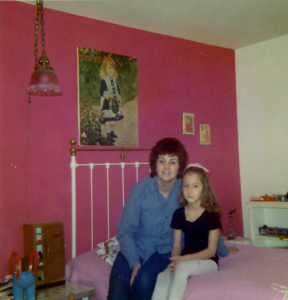Editor’s Note: On Saturday, May 5, 2012 Alyson Moadel, Ph.D. participated in the 15th Annual EIF Revlon Run/Walk For Women in Times Square. Find out more about the walk and Alyson’s participation at the end of this blog.
When I was seven, my mother, Nancy Selden, was diagnosed with breast cancer. She was 31 years old. I was too young to understand fully the implications of her illness but I knew it was serious. When I was 14, she had a recurrence. A week shy of my 17th birthday she died. She had raised my brother and me alone, so our relationship was intense. Losing her was like losing both parents at once.
In the last two years of her life, she sought help through an unconventional surgeon who believed that doctors had to know their patients to treat them, and that love was part of the equation. Bernie Siegel was his name. And while his name today evokes mixed reactions from some in the medical community who blame him for giving patients “false hope,” the intervention of this Brooklyn-born, Cornell-trained physician was undoubtedly a saving grace for my mother and me during that time. The message I learned was that it’s not how long you live, but how you live—and the same goes for how you die.
In her final days, my mother listened to Bernie’s imagery tapes and recited her affirmations; she allowed her friends to visit her and give her love, and nurtured herself with massages and creative writing. She was a fighter until the very end, but the resources she had been given helped ease her into her death. They also helped ease me into this world of loss and motherless existence.
Making sense of such tragedy and change was especially difficult when I was a teenager. But over time I realized I had a choice: I could become reckless and throw caution to the wind, or I could take the blank canvas in front of me and make a cohesive picture out of the blotches of paint that life had thrown my way.
I chose to reunite with my father after a 12-year estrangement. That led to a focus on college and psychology, the latter being something I’d always envisioned my career would be about. And it was in my junior psychology class that I heard about the possibility of an internship.
I realize now that my destiny was set once I began working with Bernie; whatever I did in my life had to continue to bring my mother’s life into view for me, if she couldn’t be with me herself. It was my way to make meaning out of her death, and to help others gain from the resources that had helped us.
Bernie’s work was a forerunner of the complementary medicine movement. One month ago, he was invited to Einstein to give a presentation. Hearing and seeing him again made me aware of the road I’ve traveled from vulnerable teen to the person I am today.
I am now a health psychologist and have been running a cancer-support program at Einstein and Montefiore Medical Center for the past 14 years. The Psychosocial Oncology Program and its wellness component, BOLD Living, is a free resource to help patients find connection, hope and care for the mind, body and spirit through activities ranging from Reiki and gentle yoga to crocheting and a drum circle. The program is also an active beneficiary of the Entertainment Industry Foundation’s Revlon Run/Walk, held this year on May 5. Since 1994, the walk has raised more than $65 million for cancer research, treatment and advocacy, including support programs like BOLD Living.
For me, the Psychosocial Oncology Program is also my way to heal myself. Some may say it’s a calling. Maybe life brings us what we need in order to heed the call given to us.
Has your life-long mission been touched by illness? Please share your story in the comments section below.
Additional Resources:
The Psychosocial Oncology Program: https://www.einstein.yu.edu/centers/cancer/support/splash.asp
Bold Living: https://www.einstein.yu.edu/centers/cancer/support/page.aspx?id=29252&page=support
Video Collection Highlighting Dr. Moadel’s Work
EIF Revlon Run/Walk: Dr. Moadel’s personal page on the EIR Revlon Run/Walk website


